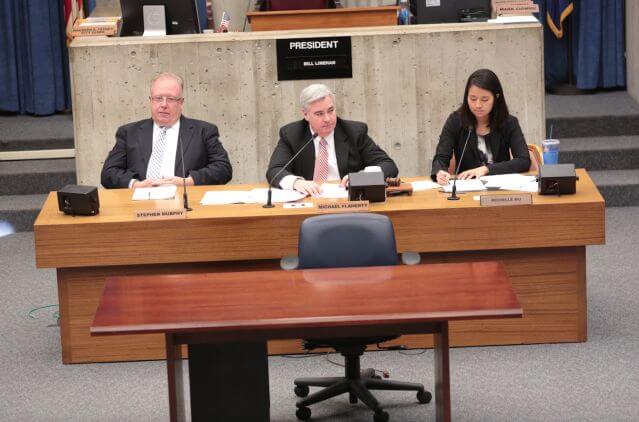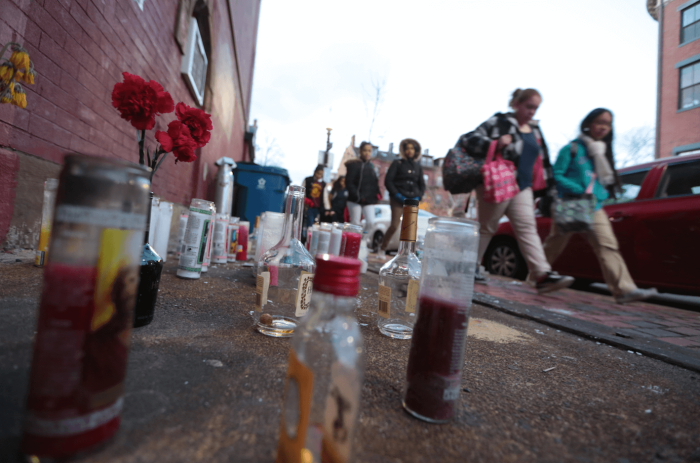When the 260 shelter residents were kicked off Long Island with less than four hours notice, a deluge of incalculable distress fell upon the city’s most vulnerable and marginalized population. The 260 people in the 11 residential programswere evacuated after experts declared that the only bridge linking the island to the mainland was on the verge of collapse. Nine months after the bridge to the city’s largest homeless shelter was torn down due to structural integrity concerns, City Councilors Ayanna Pressley, Charles Yancey and Tito Jackson held a working session to address the scores of displaced people in search of safe and clean housing and reliable detox and recovery facilities on Monday morning. “What happened in October 2014 was trauma added to trauma,” Yancey said. “People who found themselves being homeless or in need of addiction services found themselves not knowing where they could turn.” The Council is gearing up to address the need for immediate care for homeless, unemployed, addicted guests and those handling mental health issues. This is proving to be a tall task as the rate of homelessness increases in the city and the number of homeless women is the fastest growing homeless population nationwide. Proposals to move residential recovery programs to the Mattapan State Hospital and the Radius Roxbury Hospital were made without proper notice or consultation. The Safe Harbor facility, Boston’s only homeless HIV positive hospital, forced out gravely ill people onto the street without care for six months. Closing the 60-bed, five-day detox facility at the Andrew House meant nearly half of the detox beds in Boston were washed out, leaving some 1,800 people in treatment adrift. “I put myself into homelessness by walking out on my family,” former Long Island resident John Lehner said. “The programs on The Island saved my life. I knew I didn’t want to live in a cardboard box on Albany Street anymore. I went back to school and got a degree as a chef from Le Cordon Bleu.” He stood before the Councilors to combat the stigma of homelessness and stand as proof that the programs offered on Long Island turn lives around in a dignified manner.
Many spoke about feeling unsafe in general population at shelters like The Pine Street Inn and other makeshift shelters like the gym at the YMCA in South End.
While the city scrambled to open a 100-bed men’s shelter on Southampton Street, advocates and legislators alike called for more action to create and improve facilities. At the same time, the Woods- Mullen Shelter for women operates in what guest Sharon Riddick called “deplorable” conditions.
“We were promised renovations of the facility,” Riddick said. “State inspectors found 136 code violations, none of which have been addressed. There are no laundry facilities and no privacy for the showers.” The anger in the face of the lack of renovations at the women’s shelter at Woods Mullen compared to those at the men’s shelter on Southampton Street was echoed by other guests and advocates.
“This isn’t a man’s world,” Linda Burston of the Women’s Lunch Place Panel said. “They fixed up the men’s shelter first, when they’re all homeless at the same time.”
Councilor Jackson lamented over the location of the Southampton Street shelter, apologizing to those in drug addiction recovery for ending up in “the epicenter of drug availability” in Boston. Between relocating at-risk people to a drug-heavy area to kicking people in recovery programs out onto the street, advocates claim that the fact that some 3,000 people have been turned away since October has contributed to the local spike in opioid deaths. The Councilors promised the crowded room that their work in ending homelessness had only begun, as Mayor Marty Walsh has set out to end chronic homelessness in Boston by 2018.
Perhaps the most telling sign that the Council is focusing on re-bridging trust between City Hall and the people on the streets came from Councilor Jackson, who plainly said: “We are sorry to this community.”
Give me shelter: City vying to re-bridge trust between former Long Island Shelter guests

Nic Czarnecki/Metro Boston


















